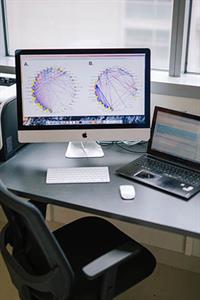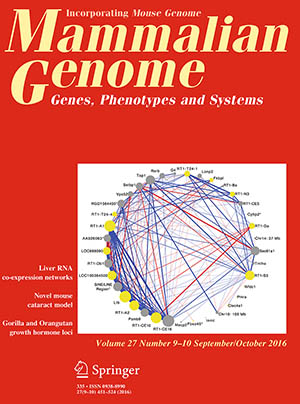Systems Genetics and Bioinformatics
The Saba Lab is focused on applying state-of-the-art statistical methodology to the systems-level analysis of the high throughput data including genetic, genomic, and proteomic studies of complex traits. Our goal is to use the data to uncover the sequence of events that starts with DNA and ends in disease. When we know the sequence of events and all the players, we can design better drugs that can effectively treat the disease and limit the side effects. We use the breadth of data available to predict the sequences of events, so a clinician or researcher can design a better experiment that has a higher probability of success and ultimately speed up the drug development process.

My research interests focus on developing and implementing systems genetics statistical models to complex traits. Currently in the lab we are working on several different projects:
- Methods for qualitative and quantitative analysis of transcripts (non-coding and coding) from RNA-Seq data
- Network analyses of RNA expression analysis
- Quantitative Trait Loci (QTL) analysis of behavioral, physiologic, and molecular traits (e.g., RNA expression)
- Analysis of quantitative proteomics analyses
- Pharmacogenetics/Pharmacokinetics
- Visualization of system genetics analysis results
- Integration of multiple types of ‘omics data
Most of my research has been studying genetic predisposition to alcohol dependence in rodent models, specifically in recombinant inbred panels of mice and rats. Much of the data produced and analysis results are available on the PhenoGen website as simple downloads or as interactive graphics.
Ongoing funded projects within the lab include:
- Identification of genetic pathways related to alcohol metabolism in the HXB/BXH recombinant inbred panel (NIH-NIAAA R24 AA013162)
- Applying Bayesian Network models to RNA expression levels from RNA-Seq and DNA sequence information to build predictive models (NIH-NIAAA R24 AA013162)
- Integrating miRNA and mRNA expression data in the LXS panel to investigate genetic determinates of alcohol dependence related endophenotypes (NIH-NIAAA R01 AA021131; PI – Katerina Kechris)
- Identification of genes and gene networks involved in regulating the stochastic determination of R7 photoreceptor cell fate within the Drosophila Genetic Reference Panel (NIH-NEI R21 EY024413; PI – Steve Britt)
- Elucidating the role of genetics in mast cell responses to engineered nanomaterial exposure using genome wide association analysis and transcriptomics with a hybrid mouse diversity panel (NIH-NIEHS R01 ES019311; PI – Jared Brown)
- Using RNA-Seq to identify genetic pathways associated with neuronal excitability in epileptic tissue (SSPPS ADR Pilot Grant with Molly Huntsman and Brent O’Neill)
- Identification of genetic predictors of cardiac allograft vasculopathy following cardiac transplantation (SSPPS ADR Pilot with Christina Aquilante and Robert Page)

Systems genetics
- Harrall KK, Kechris KJ, Tabakoff B, Hoffman PL, Hines LM, Tsukamoto H, Pravenec M, Printz M, Saba LM. Uncovering the liver's role in immunity through RNA co-expression networks. Mamm Genome. 2016 Oct;27(9-10):469-84.
- Saba LM, Flink SL, Vanderlinden LA, Israel Y, Tampier L, Colombo G, Kiianmaa K, Bell RL, Printz MP, Flodman P, Koob G, Richardson HN, Hoffman PL, Tabakoff B. The sequenced rat brain transcriptome, its use in identifying networks predisposing alcohol consumption. FEBS J. 2015 Sep;282(18):3556-78.
- Bennett B, Larson C, Richmond P, Odell A, Saba L, Tabakoff B, Dowell R, Radcliffe R. QTL Mapping of Acute Functional Tolerance in the LXS Recombinant Inbred Strains. Alcohol Clin Exp Res. 2015 Apr;39(4):611-20.
- Vanderlinden LA, Saba LM, Bennett B, Hoffman PL, Tabakoff B. Influence of sex on genetic regulation of “drinking in the dark” alcohol consumption. Mamm Genome. 2015 Feb;26(1-2):43-56.
- Hoffman PL, Saba LM, Flink S, Grahame NJ, Kechris K, Tabakoff B. Genetics of gene expression characterizes response to selective breeding for alcohol preference. Genes Brain Behav. 2014 Nov;13(8):743-57.
- Vanderlinden L, Saba L, Printz, M, Flodman P, Koob G, Richardson H, Hoffman P, Tabakoff B. Is the Alcohol Deprivation Effect Genetically Mediated? Studies with HXB/BXH Recombinant Inbred Rat Strains. Alcohol Clin Exp Res 2014 Jul;38(7):2148-57.
- Vanderlinden LA, Saba LM, Kechris K, Hoffman PL, Tabakoff B. Gene co-expression networks provide insight into genetic determinants of alcohol consumption. PLoS One 2013 Jul 23;8(7):e68878. *This publication is a result of a student’s thesis work.
Pathway analysis in proteomics analysis of protein modifications
- Shearn CT, Orlicky DJ, Saba LM, Shearn AH, Petersen DR. Increased hepatocellular protein carbonylation in human end-stage alcoholic cirrhosis. Free Radic Biol Med. 2015 Oct 27. pii: S0891-5849(15)01089-8.
- Shearn CT, Fritz KS, Shearn AH, Saba LM, Mercer KE, Engi B, Galligan JJ, Zimniak P, Orlicky DJ, Ronis MJ, Petersen DR. Deletion of GSTA4-4 results in increased mitochondrial post-translational modification of proteins by reactive aldehydes following chronic ethanol consumption in mice. Redox Biol. 2016 Apr;7:68-77.
- Coughlan C, Walker DI, Lohr K, Lazo CR, Richardson JR, Saba LM, Caudle WM, Fritz KS, Roede JR. Comparative proteomic analysis of carbonylated proteins from the striatum and cortex of pesticide treated mice. Parkinsons Dis. 2015;2015:812532.
Human gene association studies
- Zuo L, Saba L, Zhang X-Y, Krystal JH, Tabakoff B, Luo X. Significant association between rare IPO11-HTR1A variants and attention deficit hyperactivity disorder in Caucasians. Am J Med Genet B Neuropsychiatr Genet. 2015 Oct;168(7):544-56.
- Zuo L, Saba L, Wang K, Zhang XY, Krystal JH, Tabakoff B, Luo X. Exome-wide association study of replicable nonsynonymous variants conferring risk for alcohol dependence. J Stud Alcohol Drugs. 2013 Jul;74(4):622-5.
- Procopio D, Saba L, Walter H, Lesch O, Skala K, Schlaff G, Vanderlinden L, Clapp P, Hoffman P, Tabakoff B. Genetic Markers of Co-Morbid Depression and Alcoholism in Women. Alcohol Clin Exp Res. 2013 Jun;37(6):896-904.
Biomarkers
- Snell LD, Ramchandani VA, Saba L, Herion D, Heilig M, George DT, Pridzun L, Helander A, Schwandt ML, Phillips MJ, Hoffman PL, Tabakoff B; and the WHO/ISBRA Study on State and Trait Markers of Alcohol Use and Dependence Investigators. The Biometric Measurement of Alcohol Consumption. Alcohol Clin Exp Res 2012 Feb;36(2):332-41.
 | Kylie Harrall, MS Professional Research Assistant Kylie double majored in Biology and Chemistry at the University of Missouri – Kansas City, and spent the following 5 years researching and developing veterinary vaccines for Boehringer Ingelheim Vetmedica and Virginia Tech University. With the desire to learn more about data analysis, Kylie returned to graduate school at the University of Colorado – Denver and completed her MS in Biostatistics. In the Saba lab, she spends her time working with high-throughput omics datasets; this work includes the integration and interpretation of RNA-Seq and microarray data, and the development and exploration of new techniques for increasing the interpretability of omics data. |
 | Ryan Lusk, BS Doctoral Candidate Ryan graduated from the University of Minnesota – Duluth with a BS in Biochemistry and Molecular Biology. As an undergraduate, his research included supercritical fluid chromatography method development, biophysical characterization of intrinsically disordered proteins, and the development of techniques to examine light fluxes in lotic systems. Ryan entered the Pharmaceutical Sciences PhD program at the University of Colorado – Denver in 2015. In graduate school, Ryan discovered a passion for biostatistics, and his dissertation work seeks to combine this with his knowledge of living systems to interpret large, clinically relevant data sets in order to help answer today’s complex biomedical sciences questions. |
 | Harry Smith, BS MPH Student Harry earned his Bachelor’s of Science in biology from the University of Colorado in Colorado Springs, and is currently pursing his Master’s of Public Health from the Colorado School of Public Health on the Anshutz Medical Campus. His Master’s concentration is Applied Biostatistics and BioInformatics. His research interests include genetic association studies using systems genetics, as well as machine learning in the context of health and health outcomes data. Recently, he joined the Saba lab in the Skaggs School of Pharmacy and Pharmaceutical Sciences first as an intern followed by being hired as a student employee. He is investigating the genetic influences on metabolic activities in brown adipose tissue (BAT) by gene co-expression networks associated with interesting metabolic phenotypes. |
 | Lauren Vanderlinden, MS Senior Professional Research Assistant Lauren earned her bachelor’s degree in chemistry and mathematics from CU Boulder and MS in biostatistics from UC Denver. Previous to working at the School of Pharmacy, Lauren was a professional research assistant at the School of Medicine’s Proteomics Core and specialized in mass spectrometry. Her current research interests include applying statistical approaches to integrate a variety of high-throughput data and physiological trait data. Statistically determining both genetic and environmental underpinning of disease is the ultimate goal of her research. |
Precision medicine is a multidisciplinary field that thrives on the collaboration of scientists with diverse sets of skills. In the Saba laboratory, we apply biostatistics, bioinformatics, statistical genetics, and pharmacogenetics techniques to uncover biological mechanisms of disease, to identify possible pharmaceutical targets, and to identify subpopulations that would benefit from particular drug therapies or prevention strategies.
Because of the multidisciplinary nature of the field that we study, we are interested in a broad range of students and postdoctoral fellows.
Please contact Dr. Saba for more information about any of the following:
- Rotations/dissertation projects/statistical mentoring for Pharmaceutical Sciences PhD students
- Rotations/dissertation projects/statistical mentoring for Toxicology PhD students
- Thesis/dissertation projects for Biostatistics MS and PhD students
- Postdoctoral research into systems genetics and bioinformatics
